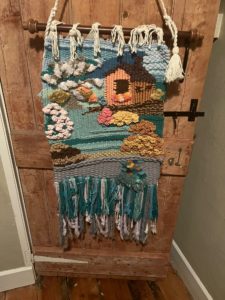Every year, we give over all of December (and usually most of January) to a series called ‘Shadows and Reflections’, in which our contributors share highs, lows and oddments from the past 12 months. Today it’s the turn of Kirsteen McNish.

The passing year has been a curate’s egg. Surprise and repetition, sadness and newly found elation. I stand at the year’s end in a field where it rains in one corner of the view, and the sun is melting the frost in the other. Light dances and gleams through the strangely bearded trees; beads and smelts like Vaseline has been applied to a lens.
I say goodbye to four of my closest friends in an Ethiopian cafe in London after ending 20 years of a life loved and fully lived in the city. After the death of my mother, January felt unkind and I found myself loosened, quiet and unbuoyed. Spring came and went in a flurry of planting seeds and making paper-thin plans, whispers soft in the garden, whilst my body felt like it had cased itself in granite, protecting a sea ever-swirling inside. In late May I work in an unforgettable event at The Minack Theatre in Cornwall and by the time I work at Sea Change festival as the month fades, I realise the hardened bit of me wants to yield and eke a way out. My friend Laura, five summers ago, said that she imagined me amongst the high singing hedges, and her vision started to rise, ink-like, blooming under my skin.
Summer became a blur of visiting swifts, quiet searching in the searing city heat. I find myself holding fast that I will find us a settling place as many pass by, out of reach, in the haar. The garden and small things are my daily tiller. I am quietly anxious as we have no certainties, jobs or places to go to — but go we must. I go to visit my Dad in Corby and he hands me books from my mother’s bookcase to take away that make me realise we had more in common that I’d realised — Scotland, the Brontës, wildflowers. My 84-year-old father is buoyant and philosophical, and I learn more recently he attended my 19-year-old nephew’s raucous gig at Glasgow Barrowlands, and drove through Glen Coe via the falls of Lora with one of my sisters, scattering my mother’s ashes in Loch Awe — a place I’m told she loved because hills are so high either side the water appears at times an inky black. He visits the McNish gravestones in Kirkmabreck churchyard and stays in Newton Stewart whilst I speak to her in my sleep.
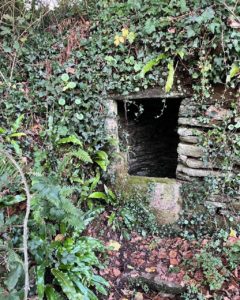
By mid-October half-told tales meet us at this house at the foot of Dartmoor. We find a huge baker’s chimney, now dislocated from the house like the hull of a boat drifted away from its moorings, in the lean-to; a tiny stone figure stuffed in our stone wall; a colony of ladybirds that sleep under the peeling bedroom wallpaper and become a tiny, woozy scarlet cloud as I brush my finger against them. I am bemused to see a sooty, womble-nosed shrew wandering dazed through the living room, like a drunk weaving its way home. Tawny owls hoot to each other amongst the myriad bright stars that make me gasp but are impossible to capture through a phone lens. There are days where summer still feels like it is the last person at the party, drinking dredges of everyone’s cup — and days of quietly drifting snow and mist that beguiles and pulls me up the fields in my bed clothes. And the rain, when it comes, is slanted, driving and hard. The white-hot moon sinks into my viewfinder, eerie and majestic like the slow films of Scott Barley. I am the mad woman not in the attic, but on the doorstep at 4am, phone pointed at skies I’ve only ever seen before in paintings. Neighbours are warm and welcoming, and one tells me that the hamlet I live in’s name is ancient Celtic for “home, household or hide”, which comforts me when I lie in bed listening to the high winds.
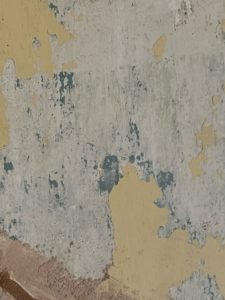
The stippled paint and lime plaster in one room looks like a huge city map, and I am reluctant to cover up its greens and yellows; years of previous inhabitants’ marks, lives and touch flaking on the walls. My bedroom reveals a signature from a decorator with flourishes on the capital letters. Perched on the sofa arm, I have a long conversation with a smiling Italian pest control man about neolithic stones, smugglers and Julian Cope.
My son one day excitedly leads me to a clear-running well opposite the house and I feel an overwhelming urge to plunge my face in its freezing water. I want to fix things here, tie things up, but something tells me to watch and wait instead, like the herons I miss with an ache that would meet me at the canal and marshes of Walthamstow.
An eye-shaped crater on the hills remains a mystery to most I ask, and the red earth is fertile and crumbles rich between my fingers. Comments expressing surprise I have made such a move make me feel bemused as I have often felt more isolated and remote in the middle of a pub in Soho.
I wake every day between 3 and 5am thinking: what needs doing? and what the fuck am I doing? From eight the house is a whirlygig carousel of tradespeople fixing the roof, chimney, windows, pipes and buckled walls as I make calls and fight bitterly to get my daughter a school place suited to her needs. She rattles, confused, like a pinball within the walls of this strange place. Such is my tiredness the paranoia sets in that the house itself rails against us— so much so I fancy some nights a gothic horror could easily be penned here. I am both alarmed and thrilled as the wind violently shakes the panes and my cat mews like Cathy to be let in again, peeing territorially in corners, jittery and skittish. I feel a strange overwhelming urge to shore the house in its moorings as water ingresses from the sieve of a chimney into my daughter’s room, through the windows and pipes under the sinks. I am a seeker of the sea and its tributaries but here it seems to be drawn towards me.
Despite the offered intel, time is neither slowed down or sleepy and the days are packed like overstuffed suitcases. As we drive my daughter is excited by high hedgerows and filtered light, whooping and laughing uncontrollably, intoxicated as she holds her hand across her face, light flittering through her fingers, wild with things we cannot see. At beloved Wonwell beach, I involuntarily smile so hard it makes my eyes run. I chase the silver tides, walking across seaweed stalks tossed across the sands like old knotty limbs. The rippling ridges left in the sand are hard and pleasingly rigid under the arch oƒ my boots and I can see Dartmoor, brown, wine and ochre, mottled in the distance. I know these hills are the ones my son sees every day from his new classroom, misted with vaporous clouds, and I feel glad of it.
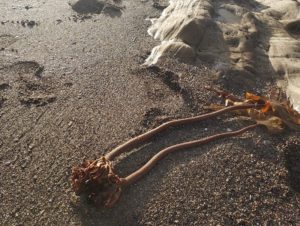
Instead of seeing Zoe with her long plaits arriving on her 70’s bike at my doorstep at weekends, I ping her pictures of the sea, and she jokes it looks “too noisy”, teasing me from afar rather than sitting at my kitchen table. I make a new friend with a Cornish name and I imagine her a modern-day Boudicca who helps bolster me when systems fail and I’m feeling my most fissured. I attend a talk as the leaves fall with Ru Callender at Dartington, his quiet modest tones filling the Great Hall as he talks about our fragile beautiful lives and deaths, and on the way home I think of the Elmhirsts, dreaming their Utopian visions into the seams of the estate.
It’s Fridays when we really meet our old selves in the corridor — the comforting sounds of my son in his online guitar lessons, his teacher harnessing his dreamer’s wafting attention and the rapport between them drifting through the door into the rest of the house like soft smoke, his tendrils wrapped around my son’s imagination. James beams monochrome under his dark fringe in his studio, surrounded by leads snaking across the walls, and tells me of the European gigs he has played whilst I have been sitting here watching the tangerine moon rise from the fields. These thrumming steel wires are telegraphs between old life and new and his warmth always leaves a vibration long after the music’s petered out.
Frazzled after a touch-paper row about something and nothing on the Winter Solstice, my small family traipses quietly in a fug up to the Scorhill stones, and two buzzards fly from the direction of the Tolman stone above where we walk, circling above us and back again. Everything suddenly feels bright and off the hook. I take a shell out of my pocket and place it on the head stone without knowing why, feeling the lichen rough under my fingertips. I whisper the name of a friend in need and think suddenly too of the press of little Max’s cheek against mine as he edges towards his first birthday, remembering his soft smell of freshly cut grass and honeyed milk. A quiet party arrives, sheets of paper are handed around, small wind chimes are brought forth from bags and incense burns, the group huddling quietly and whispering what I take to be poetry with sideways glances and sheepish smiles. I try to not peer at their gathering and fail. One man walks around touching every stone. Another gang in walking gear stand the other side of the circle, seemingly separate, in deep conversation over maps. As we walk away and reach the bottom of the hill I am startled as I hear whooping and shouting, and turn to see the two groups joined, running around the stones holding sail-sized colourful fabric above each of their heads in a ritual dance; transformed from the quiet solemn figures we had just encountered into vibrant shamanic birds.
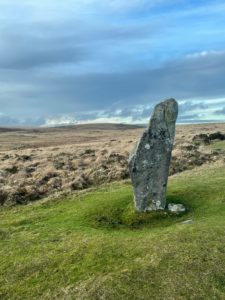
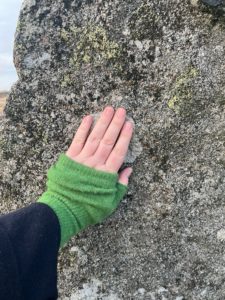
Back at home on the new moon I listen to the house heave and creak in its awnings, whilst the trampoline has taken flight, buckled, and is found bent in two resembling the sharp elbows of a well-seasoned jumble sale hustler. Sudden late-night slammed taxi doors have been replaced by something unidentifiable scratching in the eaves. I put the cracked painting I found of Eddystone lighthouse on the wall, and it beams at me thorough the darkness.
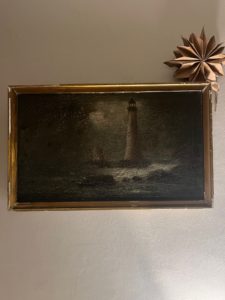
Two days before Christmas, the last of the market is seeping away and I speak to a stallholder who I chat to most Fridays. She goes into the back of her storeroom and brings out a large wall hanging she gifts to my girl, made of colourful tufts and woven strands of wool that she thinks she might like to play with, recognising her restless sensory needs. I’m touched by her kindness. As she hands it to me, she looks at me dead in the eye and tells me in her Liverpool accent to always fight for my daughter with my every breath. She speaks of her own mother and her large brood and how she’d take a local child in his wheelchair to the park with her own eight kids so he wouldn’t be alone at home. As this vibrant woman hugs me farewell, I realise the year has been bookended by the word mother and I float, dislocated momentarily in the half light in the town hall underpass.
Once home I put the hanging on the back of my daughter’s bedroom door, and notice a small house stitched into the wool. My house is starting to wear the paintings I’ve gathered over years like a green-blue harvest, and I make my marks with paint and fabric to hang temporarily, jauntily, at windows. We are, I think, starting to really come home.
